WHY should we study world mythology in our homeschool? WHAT are the best books to read about myths from around the world? Check out this round-up of the best mythology books for studying not only the more well-known Greek myths but also mythological tales from around the world. You’ll find mythology book suggestions for kids, teens, and life-long learners! But first, let’s discuss WHY studying myths is so important.
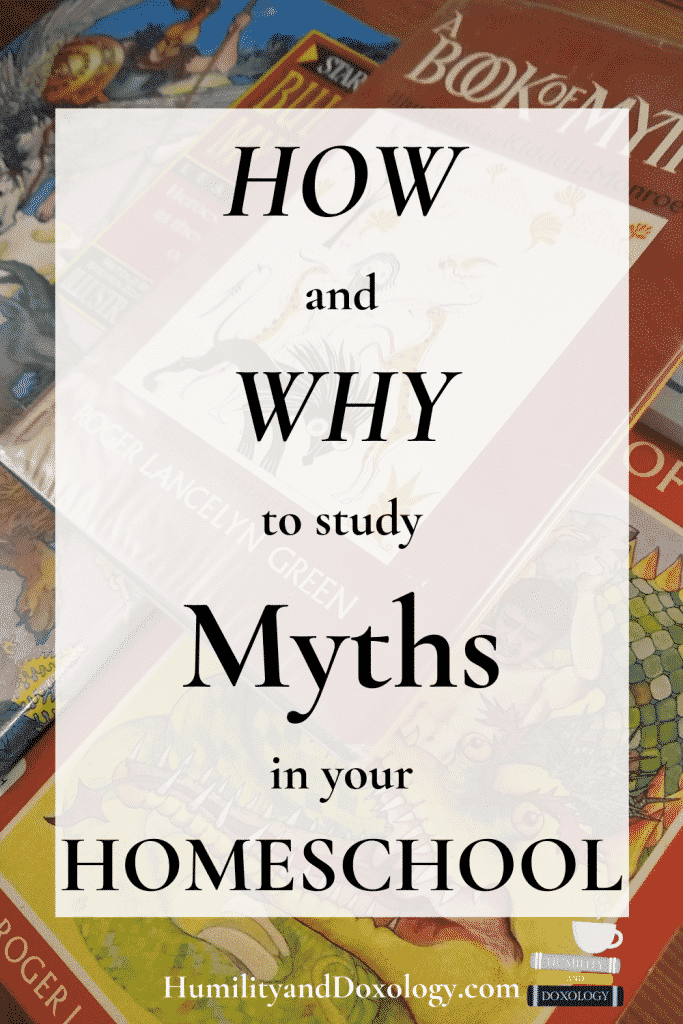
{This post contains paid links. Please see disclaimer.}
Why should we study myths?
Myths Provide Essential Cultural Literacy
When you read anything, watch anything, or listen to anything you are exposed to a variety of mythological allusions. Within the western tradition, in particular, we of course see numerous references to the myths and legends of Greece and Rome. But as our social literacy expands beyond western culture, we also see influences from the mythologies of other traditions.
In order to understand other people and other times, it is imperative that we understand their unique cultural vocabulary. That can come only from studying the stories they have told. Each of us is, whether consciously or not, formed by the presuppositions of our own time and place. In order to better understand others, we must get outside of our own cultural box.
We can do this most easily by listening to the stories others have told.
Do you think only old dead guys reference classical mythology? Yes, of course, you’re sure to find plenty of allusions to mythological characters in classic works by men like Shakespeare, Milton, Lewis, and Tolkien.
But knowing your world mythology will also help you understand modern pop culture! For instance, who can understand the line in Hamilton the Musical, “You have married an Icarus, he has flown too close to the sun,” without knowing who Icarus is and what the sun has to do with it?
Myths Demonstrate Humanity’s Universal, Shadowy Search for Truth
Some Christians are concerned that studying the mythology of pagan cultures will denigrate the value of our own faith tradition. Might we lessen the belief in the Eternal Truth of the Scriptures if we read the pagan myths? Should Christians avoid reading myths?
On the contrary, I find the fact that myths share common themes across divergent cultures actually reinvigorates my faith. Why, after all, do many cultures have common tropes like a god-man who must defeat an enemy (often a snake or serpent)? Why are there repeated themes of self-sacrifice and resurrection? Why does the hero often have to save his bride?
This unity will not surprise those of us who accept the teaching of Genesis, Romans 1, and the rest of the Scriptures. If all mankind descends from a common community who knew the Truth and the Promises, yet were given over to ignorance and darkness, would we not expect their stories to share common themes?
We must, of course, recognize that the ancients’ seeking after truth in their mythology is not the Truth itself. It does, however, point to the yearning in all of our hearts for a God outside the system who could be both just and justifier.
The pagan stories are broken, fragmented shadows that are twisted and untrue.
As Chesterton says,
“We may truly call these foreshadowings; so long as we remember that foreshadowings are shadows. And the metaphor of a shadow happens to hit very exactly the truth that is very vital here. For a shadow is a shape; a thing which reproduces shape but not texture. These things were something like the real thing; and to say that they we like is to say that they were different…They are fundamentally different exactly where they are superficially similar; we might almost say they are not the same even when they are the same. They are only different because one is real and the other is not.”
{Do you want to hear a bit more from Chesterton on the subject? I’ll share extended excerpts from Chesterton’s writing below.}
Myths are Fun
Ok, maybe that’s not really a profound rhetorical reason, but I can’t not include it. We don’t have to always get overly serious about our reasons for reading the myths.
They’re often just fascinating stories and, like fairy tales, we can enjoy them on many levels at once. They capture our imagination, enable us to make multi-faceted connections, and thrill us with tales of adventure!
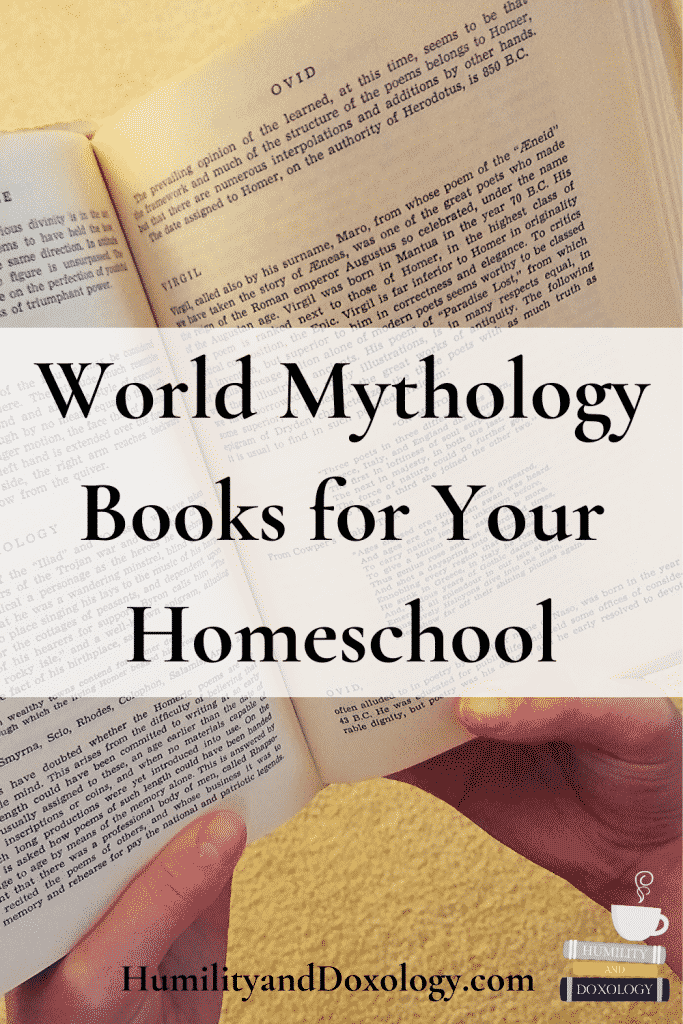
Incorporating World Mythology in Your Homeschool
The stories of mythology from around the world are a wonderful addition to your homeschool plans!
One option is to regularly include them as read-alouds during Morning Time or family reading time.
Another option is to coordinate your mythology studies with your history and/or geography studies.
(The myths of Greece, for example, are an obvious choice for your textbook-free Ancient Greece history lessons.)
You could even create an entire mythology unit study or even a unique World Mythology high school elective!
World Mythology Homeschool Book Lists
Please note that myths and legends, like many fairy tales, often include violent incidents. They also reflect pagan mores and traditions. Please use your own family’s discretion according to the sensitivity of your children when choosing from the books I list below.
In addition, while you may not want your youngest readers to read up a level, please do encourage older students to read the picture and chapter books from the earlier lists! We are never too old for wonderful children’s books, after all.
World Mythology for Beginners in Your Homeschool
Book of Greek Myths and Book of Norse Myths, Ingri and Edgar Parin D’Aulaire
{Greek and Norse} I love the fabulous picture books by the D’Aulaires. Not only are the stories well-told, the illustrations can captivate you for hours. These have been favorite books of mine since childhood!
The Gilgamesh Trilogy, Ludmila Zeman
{Mesopotamian} Beautifully illustrated retellings of the Gilgamesh epic, which is often thought of as the earliest surviving work of literature.
Favorite Greek Myths, Mary Pope Osborne
{Greek} I especially like how short each chapter is in this book. This would make a good read-aloud during Morning Time since it is already broken into manageable chunks.

Pandora, Robert Burleigh
{Greek} Beautiful picture book telling the story of Pandora and her box.

The Gods and Goddesses of Olympus, Aliki
{Greek} Short, simple introductions to the most famous Olympians. Beautiful illustrations we’ve come to expect from Aliki’s work.

Echo, Echo, Marilyn Singer
{Greek} A unique collection of reverso poems inspired by the Greek Myths

A Pride of African Tales, Donna L. Washington
{African} A beautiful collection of stories retold from the traditions of the people of Ghana, the Congo, Nigeria, and Cameroon.

Anansi and the Box of Stories, Stephen Krensky
{West African} Anansi is an important character in West African folklore and mythology. The Ashanti people of Ghana began telling his stories, and the tales spread throughout West Africa and then were carried to the Caribbean and the Americas. Sometimes he is portrayed as a man, as in this book. Other times he is portrayed as a spider, as in the picture book below.

Anansi Does the Impossible, Verna Aardema
{West African}

The Princess and the Warrior, Duncan Tonatiuh
{Mexican} A beautiful retelling of one of Mexico’s legends: the tale of Iztaccihuatl and Popocatepetl.

Japanese Myths, Legends, and Folktales, Yuri Yasuda
{Japanese} The author writes in the preface, “…when I first chose to tell Japanese tales to children of foreign countries my sole desire was to help to form in a small way a rainbow of understanding between our children’s world to those of others. For I think fairy tales of all countries, though told in various ways, are always basically the same – they differ only in customs and manners.”
The bilingual English and Japanese edition is especially fun because it introduces us to the written characters of the Japanese language as well.
(For more Japanese resources, see my list of children’s books about Japan and my introduction to the traditional Japanese poetry form of haiku.)

Chinese Myths and Legends, Shelley Fu
{Chinese} This book helpfully includes historical context, a pronunciation guide, and suggestions for further study.

World Mythology for late Elementary to Middle School in your Homeschool
Children’s Homer and other books by Padraic Colum
{Greek and Norse} The Children’s Homer was my earliest introduction to the adventures of Odysseus, Achilles, and the other heroes of Greece and Troy. It is a fabulous book and will make reading the original Greek epics much easier later on!
Colum also has several other books of myths and legends worth reading!
Tales of the Greek Heroes, Roger Lancelyn Green
{Greek} Don’t miss any of the mythology books by Roger Lancelyn Green, a member of the Inklings literary discussion group along with C. S. Lewis and J. R. R. Tolkien!
“Here I have tried to tell the tale of the Heroic Age as that single whole which the Greeks believed it to be. The result…takes the story from the myths of the making of the universe down to the death of Heracles.”
“But indeed the gods and heroes of Ancient Greece can never seem as aliens to us. Their stories are a part of the world’s heritage, they are part of the background of our literature, our speech, of our very thoughts. We cannot come to them too early, nor are we ever likely to outgrow them as we pass from such simple re-tellings as this to the Greek authors themselves…Once found, the magic web of old Greek myth and legend is ours by right – and ours for life.” (from author’s note)
(from author’s note)

The Tale of Thebes, Roger Lancelyn Green
{Greek} Stories based on those famous plays of Aeschylus, Sophocles, and Euripides, as well as source material from other original sources. This book is to the Greek plays what the Children’s Homer is to the Greek epics. Green says that not only did he use the original plays as sources for his retellings, but he even used them for portions of the dialogue.
Unfortunately, this book currently seems to be out of print. I was glad to find a used copy!

A Book of Myths, Roger Lancelyn Green
{various} This book collects some of the most important myths from a variety of cultures: Egyptian, Babylonian, Hittite, Phoenician, Cretan, Greek, Roman, Phrygian, Persian, and Scandinavian.

Myths of the Norsemen, Roger Lancelyn Green
{Norse}

Tales of Ancient Egypt, Roger Lancelyn Green
{Egyptian}

Iliad and Odyssey, Gareth Hinds
{Greek} Seriously well-done graphic novels. The illustrations use symbolism to help you understand and keep track of what is going on in the story.
Beowulf , Gareth Hinds
An Old English hero tale, retold in graphic novel form

Black Ships Before Troy and The Wanderings of Odysseus, Rosemary Sutcliff
{Greek} Retelling of the Iliad and the Odyssey in chapter book form by the author of many other fabulous middle grade and YA historical fiction works. (In fact, Dr. George Grant recommended her books in our recent conversation!)
The Wonderful Sky Boat and Other Native American Tales of the Southeast, Jane Louise Curry
{Native American} A collection of tales retold from the combined oral tradition of the peoples of the southeast of North America: the Alabama, the Apalachee, the Biloxi, the Caddo, the Catawba, the Cherokees, the Chitimacha, the Choctaw, the Creeks, the Hitchiti, the Koasati, the Natchez, the Seminoles, the Tunica, the Yamassee, and the Yuchi.

Mythology for Mature Teens and Adults
If you’re looking for retellings:
- Bulfinch’s Mythology, Thomas Bulfinch
- Norse Mythology, Neil Gaiman
- Mythology, Edith Hamilton
If you’re ready for original sources:
- Epic of Gilgamesh
- Homer (Iliad and Odyssey)
- Virgil (Aeneid)
- Sophocles
- Ovid (Metamorphoses)
- Hesiod
How will you include world mythology in your homeschool studies? Are there any favorite books or resources I’ve left off? I’m especially trying to expand our family’s knowledge of non-western myths!
G. K. Chesterton on Myth
“The place that the shepherds found was not an academy or an abstract republic; it was not a place of myths allegorized or dissected or explained or explained away. It was a place of dreams come true. Since that hour no mythologies have been made in the world. Mythology is a search.” The Everlasting Man
“Mythology is a search; it is something that combines a recurrent desire with a recurrent doubt, mixing a most hungry sincerity in the idea of seeking for a place with a most dark and deep and mysterious levity about all the places found.” The Everlasting Man
“We may truly call these foreshadowings; so long as we remember that foreshadowings are shadows. And the metaphor of a shadow happens to hit very exactly the truth that is very vital here. For a shadow is a shape; a thing which reproduces shape but not texture. These things were something like the real thing; and to say that they we like is to say that they were different…They are fundamentally different exactly where they are superficially similar; we might almost say they are not the same even when they are the same. They are only different because one is real and the other is not.” The Everlasting Man
“The first of all the difficulties that I have in controverting Mr. Blatchford is simply this, that I shall be very largely going over his own ground. My favourite text-book of theology is God and my Neighbour but I cannot repeat it in detail. If I gave each of my reasons for being a Christian, a vast number of them would be Mr. Blachford’s reasons for not being one.
For instance, Mr. Blatchford and his school point out that there are many myths parallel to the Christian story; that there were Pagan Christs, and Red Indian Incarnations, and Patagonian Crucifixions, for all I know or care. But does not Mr. Blatchford see the other side of this fact? If the Christian God really made the human race, would not the human race tend to rumours and perversions of the Christian God? If the center of our life is a certain fact, would not people far from the center have a muddled version of that fact? If we are so made that a Son of God must deliver us, is it odd that Patagonians should dream of a Son of God?
The Blatchfordian position really amounts to this–that because a certain thing has impressed millions of different people as likely or necessary therefore is cannot be true. And then this bashful being, veiling his own talents, convicts the wretched G.K.C. of paradox! I like paradox, but I am not prepared to dance and dazzle to the extent of Nunquam, who points to humanity crying out to a thing, and pointing to it from immemorial ages, as a proof that it cannot be there.
The story of a Christ is very common in legend and literature. So is the story of two lovers parted by Fate. So is the story of two friends killing each other for a woman. But will it seriously be maintained that, because these two stories are common as legends, therefore not two friends were ever separated by love or no two lovers by circumstances? It is tolerably plain, surely, that these two stories are common because the situation is an intensely probable and human one, because our nature is so built as to make them almost inevitable.
Why should it not be that our nature is so built as to make certain spiritual events inevitable? In any case, it is clearly ridiculous to attempt to disprove Christianity by the number and variety of Pagan Christs. You might as well take the number and variety of ideal schemes of society, from Plato’s Republic to Morris’ News from Nowhere, from More’s Utopia to Blatchford’s Merrie England, and then try and prove from them that mankind cannot ever reach a better social condition. If anything, of course, they prove the opposite; they suggest a human tendency towards a better condition.
Thus, in this first instance, when learned skeptics come to me and say, “Are you aware that the Kaffirs have a story of Incarnation?” I should reply: “Speaking as an unlearned person, I don’t know. But speaking as a Christian, I should be very much astonished if they hadn’t.” Christianity and Rationalism
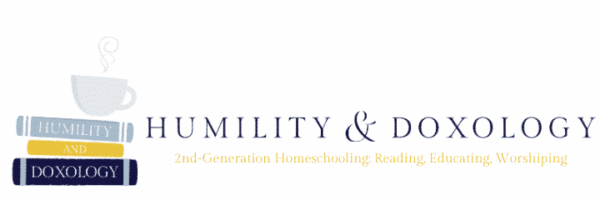
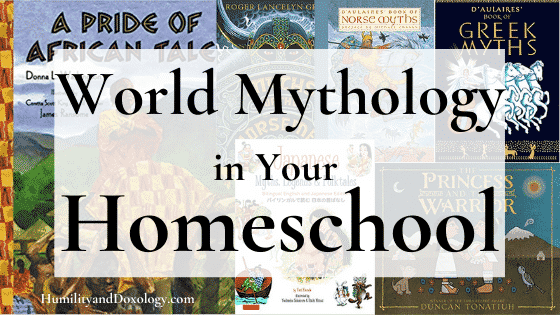


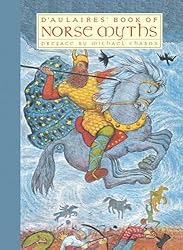


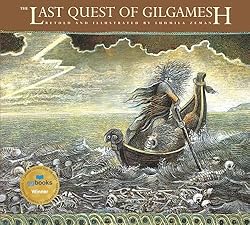


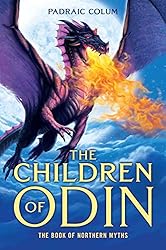
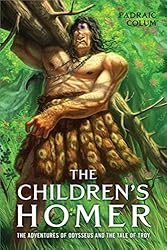
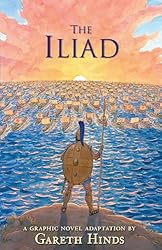
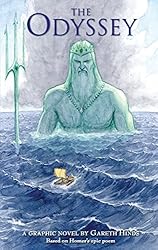
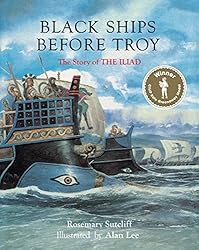
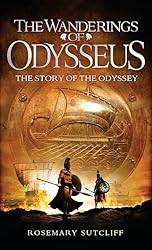
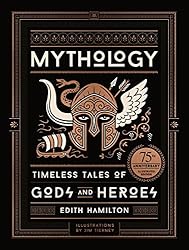
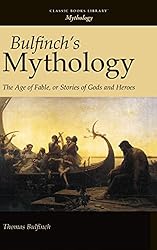








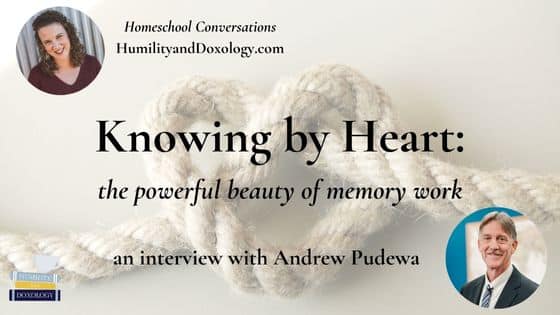
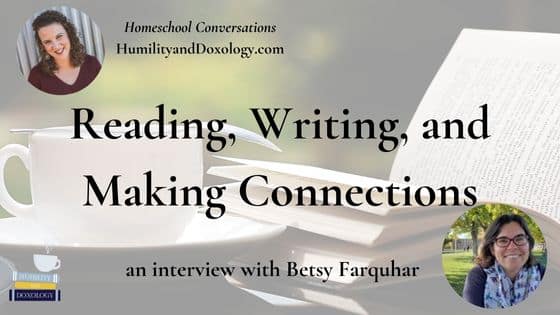

Great list. I will definitely refer to it in the future.
For myths from India, we really enjoyed Seasons of Splendor by well-known cookbook author Madhur Jaffrey. And while I loved that mythology book by Mary Pope Osborne when I was a child, it really annoys me now as an adult because while it is called Greek Myths, it uses Roman names . . . very confusing!
Oh! I will definitely check that out once the libraries open back up! 🙂
I’ve told my children what is the difference between truth & fiction & how we can learn from myths & fables like parables. I’ve explained there’s only one true God & that we can learn from everything -how to be or not to be. I’ve shared how important is is to pray for discernment. I always found it fascinating that the Indians referred to the Great Spirit & question if that’s how they were meaning God.
We have read d’Aulaire’s Greek Myths our loud. My older two children really enjoyed The Wonder Book by Hawthorne, and we will start Tanglewood Tales soon.
There is a series called Loki’s Wolves is a retelling of Norse mythology it is one of my favorites! There is also one called Where the Mountain Meet the Moon that one is Chinese.